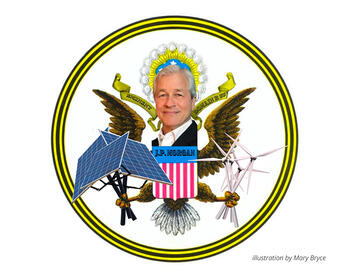
Deep Throat never said, “follow the money.”
That phrase, which has become one of the most famous axioms in politics and journalism, was featured in the 1976 movie “All the President’s Men,” which starred Dustin Hoffman and Robert Redford. But that phrase was not in the 1974 book of the same title by Carl Bernstein and Bob Woodward that recounted their investigation into the Watergate debacle. Instead, it appears the phrase was first used by an attorney named Henry Petersen who testified at a Senate Judiciary Committee hearing in 1974. It then made it into the movie screenplay which was written by Woodward and William Goldman.
Today, the phrase is part of our political vernacular. It has been used as the title in a movie, as the title of a book, and it’s used in dozens of websites, including followthemoney.org, that track political contributions.
Follow the money and you’ll understand why Jamie Dimon, the CEO of J.P. Morgan, the world’s largest bank by market capitalization, wants the government to seize private property so that his bank can finance the construction of more solar and wind energy projects in the name of doing something about climate change. Last week, in his letter to shareholders, Dimon wrote “Permitting reforms are desperately needed to allow investment to be done in any kind of timely way,” Dimon wrote. “We may even need to evoke eminent domain––we simply are not getting the adequate investments fast enough for grid, solar, wind, and pipeline initiatives.” (Emphasis added.)
Follow the money. Dimon wants the government to seize private property because his bank is one of the two biggest players in the business of tax equity finance, a $20 billion-per-year business that is crucial to wind and solar development. If those projects don’t get built. J.P. Morgan will lose out on billions in profits. To justify the taking of private property, Dimon invoked the specter of climate change, writing that the “window for action to avert the costliest impacts of global climate change is closing” and that we “need to do more, and we need to do so immediately” to meet “science-based climate targets.”
Dimon uses the word “science” to justify the seizure of private property, but what he’s advocating for is what I call climate corporatism, which is the use of government power to increase the profits of big corporations at the expense of consumers—and in particular, at the expense of small (and mostly rural) landowners—in the name of climate change.
Follow the money. J.P. Morgan’s profits last year totaled some $37.7 billion, a drop of about 20% from 2021. Dimon needs more tax equity finance deals to bolster his bank’s bottom line.
Dimon did not mention in his shareholder letter—and legacy media outlets largely refuse to cover—the raging land-use conflicts over renewable projects that are happening from Maine to Hawaii. As I have documented in the Renewable Rejection Database, since 2015, local communities and jurisdictions have rejected or restricted wind or solar projects nearly 500 times. Rural Americans are fighting these projects because they are concerned about their property values, and rightly so.
Read the rest of this piece at Robert Bryce Substack.
Robert Bryce is a Texas-based author, journalist, film producer, and podcaster. His articles have appeared in a myriad of publications including the Wall Street Journal, New York Times, Forbes, Time, Austin Chronicle, and Sydney Morning Herald.












